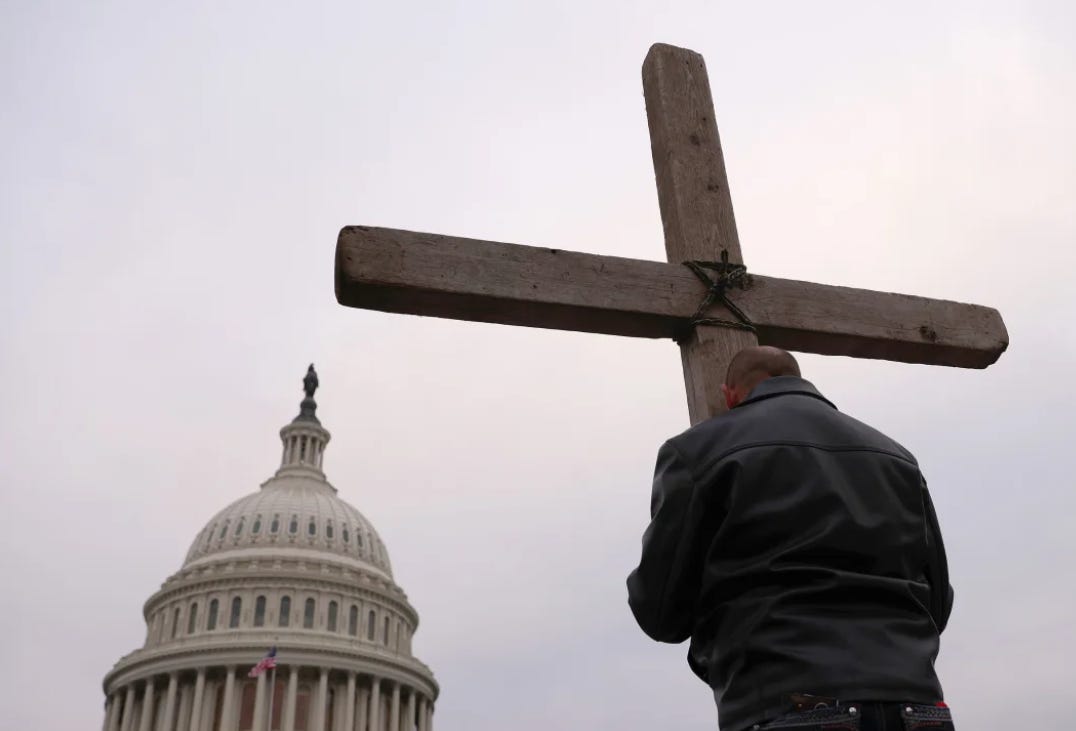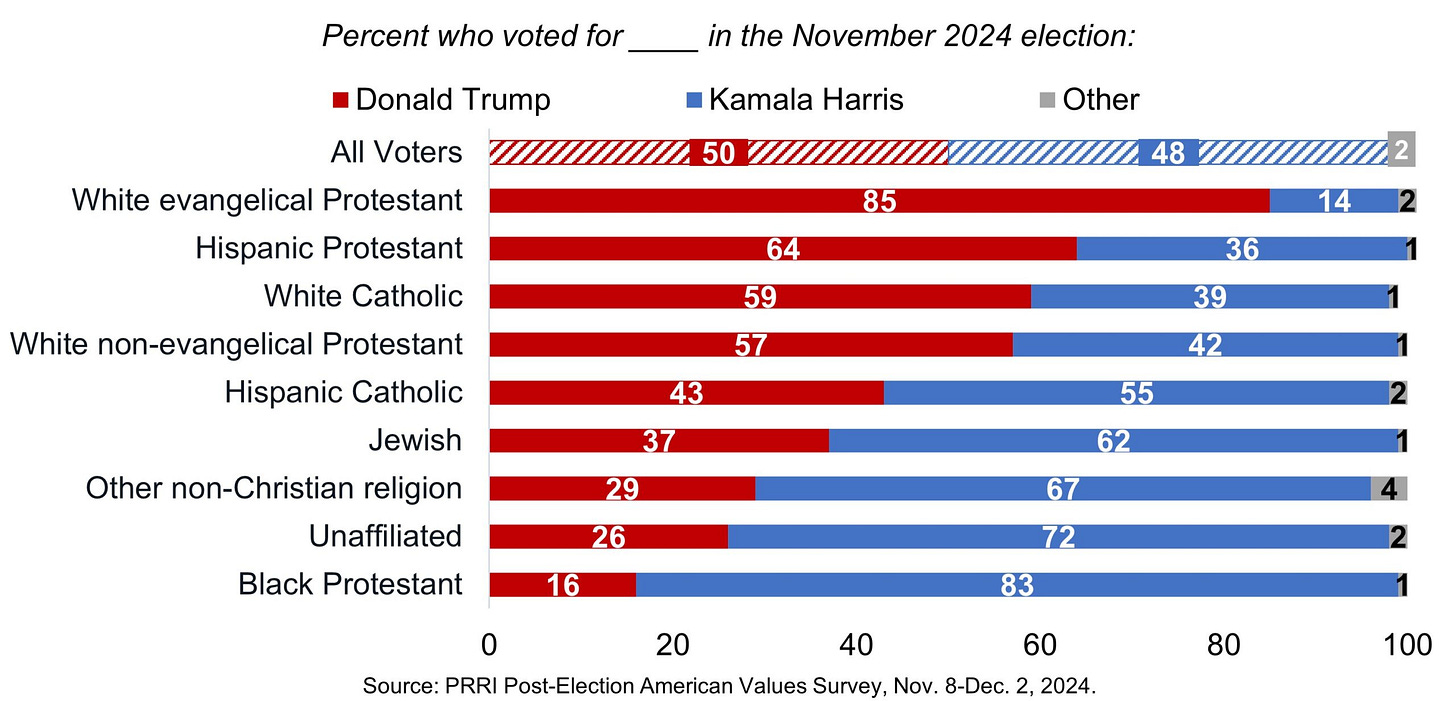A Familiar Grief: Reflections on the Inauguration
... and on how white evangelicals are trying to create a country in their own image
Things feel grim. The depth of darkness is daunting. I feel grief, and yet it is a familiar grief.
Just as church after church has allowed known clergy sex abusers to remain in the pulpit as spiritual leaders, so too half the nation has declared with their votes that an abuser is fit to lead the most powerful country on Earth.
Tomorrow, an adjudicated sexual abuser and convicted felon is stepping into the office of President of the United States — a man whom at least sixty-nine women have accused of sexual misconduct.
There’s no mistaking who Trump is. Everyone knows.
So, the apparent message is that millions of people don’t really consider sexual abuse to be a big deal – at least not big enough to matter more than the cost of eggs.
It’s the same “no big deal” message we’ve received from countless church and denominational leaders who turn a blind eye to sexually abusive clergy colleagues.
Trump’s victims are a lot like clergy sex abuse survivors
Trump, of course, has denied any misconduct and accused the women of being “political operatives,” of plotting a “conspiracy,” and of looking for their “10 minutes of fame.”
The women, who sought acknowledgment and validation, were instead called names— “liar” and “whore” — and had their physical appearance disparaged. Their motives have been questioned, sometimes even by family, and they’ve lost friends. “Move on,” people said.
Sound familiar? It’s also what happens to those who try to bring accountability for sexually abusive pastors.
White evangelicals minimize sexual abuse
With some 85% of white evangelicals having supported Trump, we clergy sex abuse survivors see the same people who supported our pastor-rapists also supporting Trump. This means religious spaces that already felt uncomfortable and unsafe may now feel even more so.
With 85%, it’s obviously not just denominational leaders who send a message that sexual abuse is no big deal. It’s also the people in the pews.
The many complicit enablers that we’ve seen in the Southern Baptist Convention and other white evangelical spaces have now become millions who chose to deny and minimize rape and abuse allegations about the man about to become president… again.
He can rally a crowd, make grandiose promises, and like an evangelical preacher, bring forth a belief in revival. People cheer and shout “Amen.”
A man with horrendous character issues surrounds himself with those who not only ignore his egregious behavior but who celebrate him, endorse him, and even idolize him.
Sound familiar?
White evangelicals treat Trump similar to how they treat abusive pastors.
In both Trumpism and evangelicalism, the message is that survivors don’t matter
Those of us abused by pastors have watched for years as leaders, communities, and even family members ignored our reports, minimized the abuses, and protected the perpetrators. We’ve seen facts obfuscated and denied, our pain dismissed, and our reputations smeared.
Trump’s re-inauguration – along with his cabal of sleazy cabinet nominees – communicates yet again the same message that church and denominational leaders have repeatedly communicated with their actions and inaction, and sometimes directly with their words: “What was done to you doesn’t matter. You don’t matter.”
Is it any wonder we feel so grief-filled and confused? So angry and exhausted? So numb and unsafe?
For some of us, as clergy sex abuse survivors, the familiarity of these feelings may span decades.
The parallels are obvious. We see a person with power who is able to trample and violate others but who avoids accountability and, to the contrary, is vaunted as a leader — and even proclaimed by some as having been sent by God.
We watch the sanitizing and whitewashing of real-life events like the insurrection, and it recalls how churches too whitewash their horrors.
We see how “alternate facts” get pumped out in much the same way that churches spin and dance every which-way to shape the narrative for their own ends. Remember when Southern Baptist leaders proclaimed a “historic moment” on the launch of a clergy abuser database with no data?
It’s all about public showmanship, and reality be damned.
We’ve experienced this before
Déjà vu. Déjà su. Déjà vécu.
Already seen. Already known. Already lived.
The idolization of abusive men who make hollow promises, reward their loyalists, and demonize critics: this pattern is something that, as clergy abuse survivors, we know painfully well.
For decades, white evangelicals have drunk the heady elixir of using faith for domination and control, and as a rationalization for ignoring sexual abuse.
Now, their systemic impunity for pastoral abusers has been carried forward into the federal government.
And just as the power of unaccountable pastors comes at the cost of the abused, so too the unaccountable power of Donald Trump will come at the cost of the vulnerable.
Not only did misogyny win in this election; so too did racism, xenophobia, homophobia, transphobia, fear, incivility, cruelty, and anti-pluralism. Millions of people across our land will likely face greater oppression and the erosion of civil liberties. (Here’s where
, one of the nation’s foremost experts on Christian nationalism, outlines what this may look like.)Almost all who aren’t white, conservative, Christian, cisgender males may eventually find themselves marginalized. And for those who were already part of marginalized communities—such as BIPOC and LGBTQ people—many will no doubt recognize the familiarity of this grief — a grief that may span generations.
White evangelicals aren’t working to foster “beloved community;” they’re trying to create a country in their own image. And Trump has promised to give it to them – to give power to what he calls “my beautiful Christians.”

What can we do?
In grief, we can often feel powerless, as though nothing we do matters. But this is exactly what authoritarians want us to believe, and it’s not true. What we do matters even if we don’t see direct results.
Darkness may indeed prevail for a time, but light will still endure. And for every small candle we carry, a corner of truth will persist.
People who went before us sacrificed for the sake of rights that we often take for granted. Most are nameless to history, but we know they were there, disrupting their lives to challenge the status quo, because they believed in the pursuit of equality and justice.
Again & again in our human history, those who fought for equality and justice -- for civil rights, women’s rights, marriage rights, and more – faced overwhelming odds. But still they persisted.
So must we.
We won’t win every battle. For a while, we may not even win very many of them. But we will win some. And so long as we keep fighting – and bearing witness -- the hope of equality and justice is not extinguished.
So how to carry on in the face of such darkness? How to keep holding forth our small candles?

For me, I know I need to focus more on being present with the beauty of the moment.
That may mean laughing at my 5-year-old grandson’s silly jokes or watching the giant maple tree in my yard as it buds out in spring.
In dark times, small things remind us of our humanity. And joy itself can be a form of resistance.
So, we must cultivate joy. We must lay up our supplies of joy, love, caring, and community in much the same way our ancestors would lay up food and wood so as to have sustenance and warmth through long winters.
What we should not do
What we cannot allow ourselves is to grow numb – to stop caring about the vulnerable and the hurting. We must stay engaged, not for the sole sake of some eventual victory, but for the sake of affirming human dignity and working for what is good.
There is no finality in the work of pursuing good in the world. There is no “happily ever after.”
We must resist and persist.
Resistance against oppressive forces is energy in the universe that is never wasted.
In solidarity.
For more insight into the culture of white evangelicalism, check out my memoir, Baptistland.







For all of this, thank you. And especially this.
“In dark times, small things remind us of our humanity. And joy itself can be a form of resistance.”
A storefront in my neighborhood painted their windows with “Joy of a form of resistance” after right-wing militia types harassed LGBTQIA+ businesses following the election. Every time I drive or walk by, that window and those words give me strength and hope.
Exactly this. Every word.
Greatly feeling the weight of it, struggling today. Thank you for putting words to it.